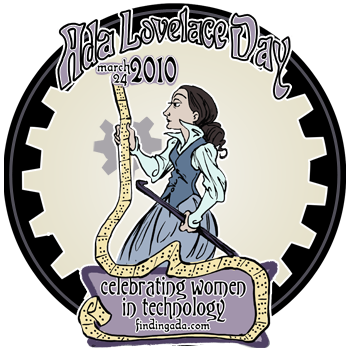Ada Lovelace Day | Emmy Noether, Mathematician
Ada Lovelace Day celebrates  the contributions of women in science and technology, follow @FindingAda for news and events. This year I've chosen to write about mathematician Amalie "Emmy" Noether. At the time of her death in April 1935, she was described by Pavel Alexandrov, Albert Einstein, Herman Weyl, Norbert Weiner and others as the most important woman in the history of mathematics. Noether’s First Theorem is a fundamental tool of modern physics and the calculus of variations: every symmetry corresponds to a conservation law. "It was her work in the theory of invariants which led to formulations for several concepts of Einstein's general theory of relativity." [J J O'Connor and E F Robertson, 1997]. Of her later work, Nathan Jacobson said: "The development of abstract algebra, which is one of the most distinctive innovations of twentieth century mathematics, is largely due to her – in published papers, in lectures, and in personal influence on her contemporaries." Einstein wrote Noether's obituary in the New York Times, May 5, 1935:
the contributions of women in science and technology, follow @FindingAda for news and events. This year I've chosen to write about mathematician Amalie "Emmy" Noether. At the time of her death in April 1935, she was described by Pavel Alexandrov, Albert Einstein, Herman Weyl, Norbert Weiner and others as the most important woman in the history of mathematics. Noether’s First Theorem is a fundamental tool of modern physics and the calculus of variations: every symmetry corresponds to a conservation law. "It was her work in the theory of invariants which led to formulations for several concepts of Einstein's general theory of relativity." [J J O'Connor and E F Robertson, 1997]. Of her later work, Nathan Jacobson said: "The development of abstract algebra, which is one of the most distinctive innovations of twentieth century mathematics, is largely due to her – in published papers, in lectures, and in personal influence on her contemporaries." Einstein wrote Noether's obituary in the New York Times, May 5, 1935:
Ada Lovelace Day | Marissa Ann Mayer, Software Engineer, Product Manager, and Executive
Ada Lovelace Day celebrates  the contributions of women in science and technology, follow @FindingAda for news and events. This year I've chosen to write about Marissa Ann Mayer Software Engineer, Product Manager, and Executive, currently President and CEO of Yahoo! Over her career Ms Mayer earned exceptional recognition for Computer Science teaching (while working for her Stanford degrees), software engineering, design, product management, and her executive skills. Ms Mayer joined Google as employee number twenty in 2009 and played an instrumental role leading Google Search for over 10 years.
the contributions of women in science and technology, follow @FindingAda for news and events. This year I've chosen to write about Marissa Ann Mayer Software Engineer, Product Manager, and Executive, currently President and CEO of Yahoo! Over her career Ms Mayer earned exceptional recognition for Computer Science teaching (while working for her Stanford degrees), software engineering, design, product management, and her executive skills. Ms Mayer joined Google as employee number twenty in 2009 and played an instrumental role leading Google Search for over 10 years.
Ada Lovelace Day | Sunita Williams, Astronaut and Captain U.S. Navy
 Ada Lovelace Day celebrates the contributions of women in science and technology. This year I've chosen to write about Suni Williams, NASA Astronaut and US Navy Captain currently commanding Expedition 33 on the International Space Station. I hope young women reading about Ada Lovelace Day now are encouraged by her example to pursue their dreams where ever they may lead - here on Earth or as the first Earthling to set foot on Mars.
Ada Lovelace Day celebrates the contributions of women in science and technology. This year I've chosen to write about Suni Williams, NASA Astronaut and US Navy Captain currently commanding Expedition 33 on the International Space Station. I hope young women reading about Ada Lovelace Day now are encouraged by her example to pursue their dreams where ever they may lead - here on Earth or as the first Earthling to set foot on Mars.
Ada Lovelace Day | Betts Wald, US Naval Research Lab
 Ada Lovelace Day celebrates the contributions of women in science and technology. I've chosen to write about Betts Wald who was a branch chief in the Communications Science division of the US Naval Research Laboratory (NRL) when I first met her. I joined NRL in 1974 as my first real job - after serving in the US Army when I was drafted as a graduate student at Brown. It was a great experience. NRL was full of wildly talented, energetic and brilliant managers who knew how to get impossible things done in engineering and government, and taught that skill to their teams. Betts was one of the best: leading and inspiring her team, running interference, providing just enough technical guidance (i.e. to avoid permanent damage) while constantly encouraging and developing her team's talents. Women in science and technology should be encouraged to consider career paths as leaders as well as individual contributors: Betts is a great role model. Although I never heard Betts shout: "To the difference engine!", except for the pipe it would be in character. And I'm not certain about the pipe.
Ada Lovelace Day celebrates the contributions of women in science and technology. I've chosen to write about Betts Wald who was a branch chief in the Communications Science division of the US Naval Research Laboratory (NRL) when I first met her. I joined NRL in 1974 as my first real job - after serving in the US Army when I was drafted as a graduate student at Brown. It was a great experience. NRL was full of wildly talented, energetic and brilliant managers who knew how to get impossible things done in engineering and government, and taught that skill to their teams. Betts was one of the best: leading and inspiring her team, running interference, providing just enough technical guidance (i.e. to avoid permanent damage) while constantly encouraging and developing her team's talents. Women in science and technology should be encouraged to consider career paths as leaders as well as individual contributors: Betts is a great role model. Although I never heard Betts shout: "To the difference engine!", except for the pipe it would be in character. And I'm not certain about the pipe.
Ada Lovelace Day | Fran Allen, IBM Fellow and A.M. Turing Award Winner
 For the second annual Ada Lovelace Day, March 24, 2010 - celebrating women in science and technology - I've chosen to write about Frances E. Allen, IBM Fellow, Turing Award winner and pioneer in the theory and practice of optimizing compilers. I've never had the pleasure of meeting her in person, but I'll take the liberty of calling her Fran, as Dick Merwin and everyone I know called her in their Fran stories.
For the second annual Ada Lovelace Day, March 24, 2010 - celebrating women in science and technology - I've chosen to write about Frances E. Allen, IBM Fellow, Turing Award winner and pioneer in the theory and practice of optimizing compilers. I've never had the pleasure of meeting her in person, but I'll take the liberty of calling her Fran, as Dick Merwin and everyone I know called her in their Fran stories.
Ada Lovelace Day | Professor Lee S. Sproull, Stern School, NYU

For this first Ada Lovelace Day I've chosen to write about Professor Lee Sproull an internationally-recognized sociologist whose research centers on the implications of computer-based communication technologies for managers, organizations, communities, and society. Professor Sproull is a pioneer and visionary in the rigorous study of what we now call social software.
 I18N ERROR: @tsiskin#footer_RSS_Feed
I18N ERROR: @tsiskin#footer_RSS_Feed